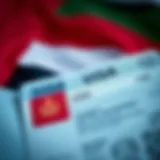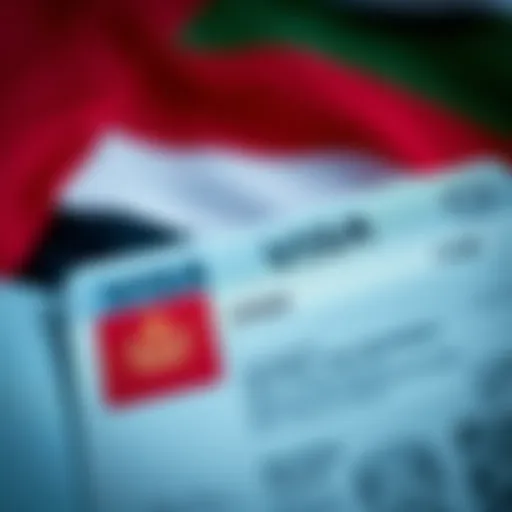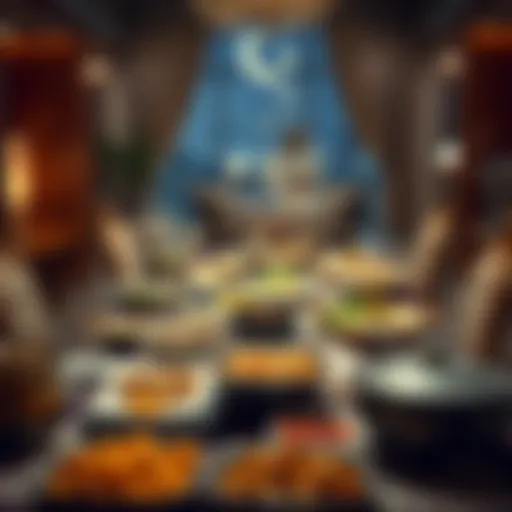Understanding Eid: Celebrations, Dates, and Traditions


Intro
Eid is a remarkable celebration steeped in rich history and cultural significance for Muslims around the world. This festive occasion marks the end of Ramadan, a month devoted to fasting, prayer, and spiritual reflection.
The holiday comes in two distinct forms: Eid al-Fitr and Eid al-Adha. Each holds its own unique meaning and practices, contributing to the diverse tapestry of Islamic culture. This article aims to provide a thorough understanding of the various facets of this holiday, particularly focusing on its significance, planned observances, as well as the influence of Eid on daily life factors like community interactions and real estate trends in dynamic locations such as Dubai.
The timing of Eid changes each year, determined by the lunar calendar. Each year brings its own set of dates, altering when friends and families gather to celebrate. Understanding these dates allows for better preparations and showcases the holiday's importance on both personal and societal levels.
Eid also has a substantial impact on local customs, community engagement, and notably the real estate market in hubs like Dubai. The interplay between the holiday and market trends can provide insights into investment opportunities. This article will serve as an enriching guide for investors, home buyers, and property managers keen on understanding this vital cultural event and its broader implications.
As we delve deeper, we will explore market trends during Eid, identify the best areas for real estate investment, and offer tips for diving into the property market, especially for those taking their first steps as investors.
Preface to Eid Holidays
Eid holidays hold a significant place in the cultural and religious tapestry woven across many Muslim communities. Understanding Eid goes beyond merely recognizing a series of dates on a calendar; it offers insight into communal values, familial bonds, and even economic activities. This article aims to illuminate these finer points about Eid—the dates it falls on, its inherent significance, and the diverse cultural practices that embellish its celebrations.
A key element to understanding Eid is its dual celebration, which encompasses Eid al-Fitr and Eid al-Adha. Both of these occasions are steeped in history and serve as important markers of the Islamic faith. Moreover, the practices vary dramatically across different cultures, which adds layers of richness to the celebrations. By delving into the nuances, readers can gain a deeper appreciation of Eid's role in uniting communities and fostering a spirit of togetherness.
Each year, millions of people engage in various forms of observance, whether it’s attending prayers, delighting in special meals, or partaking in acts of charity. This not only reinforces their faith but also highlights the importance of collective responsibility found in the teachings of Islam. In the context of contemporary life, especially in urban settings like Dubai, Eid also serves as a catalyst for economic activities. Real estate markets heat up during this time as families prepare to celebrate, and this article will explore how such trends interact with the festivities.
As we move forward, we will explore the specifics of the Eid celebrations, unravel their historical context, and investigate how they manifest differently across the globe. By doing so, the reader will be equipped to better understand the holiday's multifaceted nature and its various implications on society, particularly in the vibrant arena of real estate and community activities.
Eid embodies not just the observance of religious traditions, but also the dynamic interplay of culture, community, and economy.
When is Eid Celebrated?
Eid celebrations are pivotal markers in the Islamic calendar, linking communities and offering a rhythm to social life. But what makes the timing of Eid so important?
Understanding when Eid is celebrated involves unpacking a complex interplay of lunar cycles, cultural traditions, and community values. This section dives into the intricacies of determining the dates for Eid, emphasizing why these dates hold profound significance for believers, local customs, and economic activities—especially in regions like Dubai where Eid has a unique impact on the real estate market.
Determining the Eid Dates
The Islamic calendar is lunar, meaning that it relies on the phases of the moon. Eid al-Fitr is celebrated on the first day of Shawwal, the month that follows Ramadan, while Eid al-Adha falls on the 10th day of Dhu al-Hijjah.
Once the crescent moon is sighted, local mosques and Islamic authorities announce the date of Eid. This reliance on lunar observation can lead to differences in the dates celebrated in different countries. Often, communities may celebrate a day later or earlier due to varying moon sightings, creating a rich tapestry of traditions.
- Cultural Practices: Markets bustle late into the night as people prepare for celebrations. Buying new clothes and sweet treats is common.
- Religious Observance: Eid prayers, which are a central component of the festivities, take place in the morning.
This system of determining dates allows for local customs to take root, making each Eid a unique experience influenced by the community's traditions and practices.
Variability in Eid Dates
The variability in Eid dates can spark lively discussions, especially when one community might celebrate a day earlier or later than another. Not only does this highlight the importance of local traditions, it also frames how Eid is absorbed into the fabric of diverse communities.


The differences can contribute to the economic pulse of regions. In Dubai, for example, when Eid is celebrated can lead to peak periods for travel bookings, shopping, and even real estate transactions, making it essential for investors and property owners to stay informed.
"Eid is more than just a holiday; it signifies a time for growth and reflection within communities. Knowing when Eid falls can significantly affect lifestyle choices and investment decisions."
- Global Variability: Communities across continents might shift their dates according to regional moon sighting traditions.
- Economic Implications: Businesses gear up for the influx of shoppers and travelers around these dates, and understanding the variability can help prepare stakeholders for demand surges.
In summary, the question of when Eid is celebrated serves as a gateway into understanding the values intrinsic to the holiday's observance. It is not simply about marking a date but recognizing how timings influence community gatherings, economic activity, and cultural expressions.
Types of Eid
Understanding the types of Eid is key to appreciating the richness of Islamic traditions. Each type carries its own unique significance, unfolding different layers of faith, culture, and community. This article delves into the two major types of Eid: Eid al-Fitr and Eid al-Adha.
Eid al-Fitr: Celebration of Breaking the Fast
Eid al-Fitr marks the conclusion of Ramadan, a month dedicated to fasting, prayer, and reflection. It is a time of joy that signifies not just the ending of a rigorous spiritual journey but also the beginning of gratitude and communal harmony. Muslims financially prepare for this holiday through Zakat al-Fitr, a form of charity aimed at assisting those in need, ensuring that everyone can partake in the celebrations.
On the day of Eid al-Fitr, the air buzzes with excitement. Families don their finest dresses, children especially indulge in new outfits, symbolizing the freshness of this festive occasion. One can't help but notice the beautiful Eid prayers that take place in large congregations, where communities come together to express their gratitude.
After prayers, the gatherings usually overflow with sumptuous feasts. Traditional dishes vary by region but often include delectable sweets like baklava or seviyan. This holiday emphasizes unity and generosity, making it a perfect opportunity for family gatherings and community bonds to strengthen.
Eid al-Adha: The Festival of Sacrifice
Eid al-Adha tells a profound story of sacrifice and obedience. It commemorates the willingness of Prophet Ibrahim (Abraham) to sacrifice his son as an act of obedience to God, a sentiment capturing the essence of faith in Islam. Celebrated after the Hajj pilgrimage, this Eid embodies the spirit of sharing and philanthropy deeply rooted in Islamic ideology.
During this time, it’s customary for wealthy individuals to slaughter livestock – typically sheep, goats, or camels. This sacrificial practice symbolizes giving up something valuable for the greater good, and the meat is typically divided into three parts: one third for the family, one third for relatives, and one third for those in need. This distribution further emphasizes the importance of community support and fellowship.
While the rituals may vary, the underlying messages of sacrifice and devotion remain constant. Many families take the opportunity to reflect on their blessings during this time, often hosting large meals where everyone contributes. It becomes a celebration of compassion, reverence, and sharing, forging deeper connections within families and communities.
Both Eid al-Fitr and Eid al-Adha illustrate the diverse yet harmonious aspects of Islamic life. They are not merely observances, but are instead profound reminders of resilience, obligation, and the spirit of generosity that transcends borders and cultures.
Cultural Significance of Eid
Understanding the cultural significance of Eid requires a mindful exploration of its myriad dimensions. This holiday serves not only as a time for personal reflection and spiritual growth but also as an opportunity for community bonding and cultural expression. Its importance spans various layers, which enrich the lives of those who participate in these celebrations, particularly in vibrant locales like Dubai.
Religious Importance
At its core, Eid is steeped in spiritual significance. For Muslims around the world, Eid signifies a potent moment of gratitude and devotion. The observance begins with prayers that reinforce the sense of communal worship. The collective gathering for Salat al-Eid, or the Eid prayer, fosters a deep sense of belonging.
The decisions around charitable giving, such as Zakat al-Fitr, highlight the holiday's commitment to social justice. This duty obliges believers to provide for those less fortunate, ensuring that everyone can partake in the festive spirit. Such acts are reminders that spirituality and social responsibility go hand-in-hand. This intertwining is fundamental to the essence of Eid, distinguishing it as a time of both personal and collective piety.
Community and Family Gatherings
Eid is more than just a religious observance; it’s a family affair. The holiday creates an environment where extended families can reconnect and strengthen their bonds. In many cultures, traveling long distances to be with family is not uncommon, reflecting the deep commitment to kinship.
During this time, communities often organize events like fairs and public gatherings. The emphasis on sharing happiness is palpable. Streets adorned with lights, public festivals, and the sound of laughter echo through neighborhoods as families share meals and stories. There’s an unapologetic warmth that envelops these gatherings, creating an atmosphere that even outsiders can feel part of.


"Eid serves as a vibrant reminder of the power of unity, as families come together not just to celebrate but to share their hopes and dreams."
The melding of traditions also plays an important role. In multicultural settings like Dubai, one can observe a delightful blend of customs and practices, further enriching the experience. Festivals may include traditional dances, music performances, or local artisans displaying their crafts. Such events showcase the city’s diversity while keeping cultural heritage alive.
Culinary Traditions
Culinary practices during Eid are another vital aspect, imbuing the holiday with flavors that symbolize festivity and gratitude. Each region offers its signature dishes, presenting a smorgasbord that tantalizes the senses.
In many homes, a variety of sweets, like Baklava or Knafeh, often take center stage. The act of preparing and sharing these delightful treats mirrors the joys of giving and receiving, echoing the shared nature of Eid. Meals feature rich, savory dishes that are often prepared well in advance, inviting friends and family to partake in a feast that symbolizes abundance and joy.
The communal aspect of meals should not be overlooked. Rather than individual servings, it's common for families to serve food in large platters, encouraging everyone to share and enjoy together. The act of sharing food not only nourishes the body but also strengthens the bonds between participants.
Global Observances of Eid
The significance of Eid celebrations transcends borders, capturing the essence of unity in diversity. This section aims to shed light on how various cultures commemorate Eid, ensuring that this cherished occasion resonates in the hearts of millions. Understanding these global nuances is crucial, especially for investors and property managers looking to engage with communities during this vibrant period. With each region adding its own flavor, the festivities become not just a date on the calendar but a tapestry of shared experiences.
Eid Celebrations Around the World
Eid is a global phenomenon that manifests uniquely in different locations. From the sandy streets of Dubai to the bustling markets of Jakarta, the ways people celebrate can shine a light on local customs and traditions.
- In Saudi Arabia, Eid is a time of grand feasts and plentiful gatherings. The breaking of fasts during Eid al-Fitr often includes large buffets laden with dishes such as kabsa, appealing to both locals and expatriates.
- Turning to Turkey, the holiday known as Ramazan Bayramı (Eid al-Fitr) features special prayers in mosques, followed by home visits where sweets like baklava are served, symbolizing hospitality and joy.
- In Egypt, the bustling streets fill with joyful laughter and children dressed in new clothes. The traditional dish of Koshari often gets a festive twist during Eid celebrations, illustrating how food brings families together.
- One cannot overlook countries like Indonesia, where Eid is marked by Salat in outdoor mosques or community fields, and a special delicacy known as ketupat is served, further enriching the cultural significance attached to the festival.
Each of these examples highlights that though Eid is universally revered, the local customs and traditions breathe life into the celebrations, making them distinct. Observing these practices fosters a deeper understanding of the cultural tapestry surrounding Eid.
"Eid is not merely about the festive spirit; it's about connecting with one another through shared experiences and cultural expressions."
Eid in the Middle East vs. Other Regions
In the Middle East, Eid is celebrated with grandeur, often influenced by rich traditions that have been passed down through generations. The ambiance is electrifying with fireworks illuminating the night sky, and the streets resonate with songs and laughter.
Meanwhile, in regions such as North America or parts of Europe, while the essence of Eid is respected, the scale of celebration may not match the heart of Middle Eastern festivities. Here, the focus might be more on family gatherings in homes rather than grand public events.
- In the Middle East:
- In North America:
- Community engagement shines; large prayers in mosques attract throngs of worshippers.
- Business activities often come to a standstill as people prioritize family and faith.
- Eid celebrations might take place in community centers or homes.
- Many immigrant communities strive to recreate traditions for younger generations, blending cultural aspects from their home countries with new local influences.
In discussing these variances, one can appreciate the ways tradition adapts while maintaining core values. This interplay between culture and observance offers insights that can be invaluable for real estate investors or developers aimed at enhancing community engagement during festive periods.
Understanding the global observances of Eid not only celebrates identity but also emphasizes how embracing diversity can lead to more meaningful interactions in thriving neighborhoods.
Eid Holiday Impact on Dubai's Real Estate
The Eid holidays hold significant sway over various aspects of life in Dubai, particularly the real estate market. This period of celebration often brings a surge in activity, both in residential and commercial sectors. Understanding the implications of Eid on real estate is crucial for investors, home buyers, and property managers alike. The festivities can lead to increased demand for properties, with many seeking to purchase or lease homes in preparation for family gatherings and community events.


Market Trends During Eid
During Eid, real estate trends often shift noticeably. The atmosphere tends to become vibrant, with buyers and renters eagerly looking to secure spaces to host family and friends. Many families take this time to invest in larger accommodations to accommodate gatherings. Furthermore, rental demand soars for short-term leases as expatriates and locals alike travel home or host visiting family.
- Increased Transactions: Historically, transactions tend to spike just before and during the holiday. Realtors see intensified activity as families prioritize space for festive feasts and socializing.
- Demand for Luxury Properties: High-end properties often attract attention, as affluent buyers look to impress guests and provide a comfortable environment during celebrations.
- Commercial Real Estate: Businesses in Dubai often experience a boost in foot traffic, leading companies to consider renting larger spaces or relocating to more populated areas.
Eid holidays create a unique opportunity for stakeholders in the real estate market to capitalize on this festive spirit, responding to the heightened demand by showcasing desirable properties and tailored services.
Eid as a Time for Investment Opportunities
Eid isn’t just a time for family and festivity; it’s also a potential goldmine for those looking to invest in real estate. Savvy investors recognize that the influx of people during this holiday can drive up property values, making it an optimum time to enter or expand in the market.
- Seasonal Offers: Developers often roll out attractive deals to entice buyers, providing the perfect impetus for those considering investing.
- Networking Potential: Events held during Eid create a fertile ground for networking. Investors can meet potential partners, clients, and even sellers, laying the groundwork for future deals.
- Long-term Benefits: Properties acquired during this period can yield benefits well beyond the holiday, as the demand for good locations continues to grow in the wake of celebrations.
Eid’s unique status in Dubai’s cultural calendar means that the holiday brings with it both challenges and abundant opportunities in the real estate sector. For those involved, understanding these dynamics can facilitate strategic decisions that align with market trends.
Practical Aspects During Eid
The Eid holiday is not just about the celebrations, but also about practical considerations that influence daily life, especially in vibrant cities like Dubai. Understanding these practical aspects helps one navigate the holiday more effectively, ensuring a smooth experience whether you are participating in the festivities or conducting business. This article segment delves into two key areas: the schedules of work and schools during Eid, as well as travel considerations that arise during this significant time. Both are essential for anyone looking to engage fully in the spirit of Eid while managing their personal or professional commitments.
Eid Holiday Schedules: Work and Schools
During Eid, work and school schedules undergo significant changes, allowing individuals to join in on the festivities and religious observances. Many businesses close for a few days, giving employees a chance to celebrate with family and friends. In Dubai, companies often provide a holiday for Eid that ranges from one to three days, depending on the employer's discretion and the local regulations. This provides a golden opportunity for families to come together, share meals, and participate in prayers in the mosques.
Adjusting to Holiday Schedules:
- It's wise to check with your employer well in advance regarding the holiday schedule, as some workplaces may adopt flexible hours to accommodate varying traditions and personal plans.
- Schools typically announce their Eid break a week or two before the holiday. Parents should prepare for these changes by arranging care for younger children who may not attend school.
- Given the influx of tourists during this time, families may also plan outings and activities well ahead of time, ensuring they make the most of their time off.
Remember: The overlap of work holidays and school breaks offers an excellent opportunity for families to travel, either locally or abroad, without the stress of juggling work and educational commitments.
Travel Considerations During Eid
Traveling during Eid can be both an exciting and challenging experience. As the holiday approaches, many individuals plan trips to visit family or take a well-deserved vacation. However, travelers should be mindful of specific factors that can impact their journey.
Key Considerations for Traveling During Eid:
- Increased Traffic: Major roads and airports can become freighted with travelers. It’s best to book flights and make travel arrangements well ahead of time to avoid paying a premium or facing shortages in availability.
- Accommodation: Hotels and rentals see a surge in demand as people flock to popular destinations. Booking in advance can save both time and money.
- Cultural Sensitivity: It’s crucial to be respectful of the local customs and traditions during Eid. Understanding how the locals celebrate can enrich your travel experience and foster goodwill.
- Festive Events: Many cities host events and activities related to Eid, which can be wonderful for experiencing the local culture. Researching these events in advance can allow travelers to participate and make their trip even more memorable.
In summary, understanding the practical aspects of Eid celebrations — particularly regarding work schedules and traveling — puts individuals in an advantageous position to truly benefit from everything the holiday has to offer. With careful planning and awareness, one can engage fully in the wonders of the Eid holiday while balancing personal or professional commitments.
Culmination
In summarizing the rich tapestry of Eid celebrations, it becomes clear how the holiday serves as a pivotal event in the calendars of communities worldwide. The discussions highlighted in this article provide a comprehensive overview of the various dimensions of Eid, from its cultural importance to the diverse practices that embody it. Each reflection sheds light on why Eid continues to resonate profoundly with millions.
Reflection on Eid's Enduring Relevance
Eid isn't just a holiday; it’s a vibrant expression of cultural heritage and familial bonds. Each year, the significance of this celebration reaffirms the values of community, generosity, and collective spirit that are critical in today’s fast-paced world. By gathering with family and friends, individuals find common ground, revitalizing relationships and fostering a sense of belonging. The culinary traditions, rich aromas wafting through homes, and laughter shared at festive tables are all hallmarks of this period.
In the context of Dubai, the festivities extend beyond personal circles into communal experiences, significantly influencing social dynamics and economic activities. As the city gears up for the holiday, businesses often see a surge in local investments, and real estate gains a particular spotlight. Opportunities sprout up, encouraging investors and home buyers alike to participate in the cultural inclination to celebrate.
We must not overlook the adaptability of Eid celebrations in various cultural contexts, reflecting local customs even while upholding shared practices across the globe. From Turkey to Indonesia, each locale adds its distinct flavor to the traditions, showcasing cultural diversity. This adaptability ensures that Eid remains relevant regardless of the changing times.















